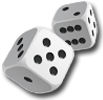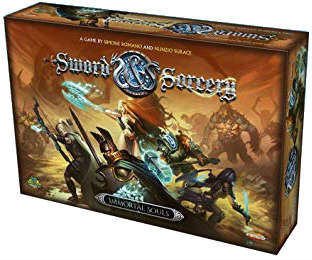



play board games
Board game reviews, strategy tips & session reports
Sword and Sorcery Board Game Review
 Stats:
Stats:
No. of players: 1-4
Amount of time to play: 60-180 min (depending on the scenario)
Age requirements: 14+
Set-up time: 5-10 min
Sword and Sorcery is a cooperative, story-driven, dungeon crawl. You and your friends must work together to defeat evil and save the kingdom.
Sword and Sorcery Rules Description:
Sword and Sorcery plays similarly to Galaxy Defenders, but it has a different feel. It is made by the same company and uses many of the same mechanics. But it is not just a rethemed version of the exact same system.
You start Sword and Sorcery dead, but in the first scenario you are brought back to life to save the kingdom. The base game has five heroes you can choose to play. Each is unique with their own strengths and weaknesses. You can choose to play a more lawful or chaotic version of each hero too. As you gain points your hero levels up. This increases the number of actions they can take, hit points, powers and talents. All of this is tracked on your Soul Gem dial.
Each turn is divided into three phases, Time, Combat, and Event. During the Time phase you are reset things, it is basically an upkeep phase. Combat is just what it sounds like, your hero moves fights and takes their actions then the enemy does the same. In the Event phase you either draw an Event card or resolve one previously drawn. So every other turn you resolve an Event card.
Combat is fairly straightforward. You roll a certain number of dice based on the weapon (or spell) you attack with. You may need to add or subtract hits depending on the situation. Then the defender removes hits based on their armor and resistances. If you have a magic shield it removes hits too. Then for each hit remaining the defender rolls a die. Each shield result negates another hit. Any remaining hits remove hit points and dropping to zero hit points results in death. Players are not eliminated from the game but are greatly hampered until they can be resurrected.
Each scenario has different victory or defeat conditions. Depending on how well you do you might skip a quest, lose some rewards, or gain nothing and have to try the quest again.
Quick Review of Sword and Sorcery:
Sword and Sorcery is a fun story-driven adventure board game. It plays well and scales with different play counts but the more players the longer it will take (especially the first couple of plays). You can play it solo as well using mora than one hero.
The components for this game are excellent. The miniatures, tiles and tokens look really nice and the game looks great on the table. The rulebook is kind of thick but has plenty of examples. There were a couple instances where I had to google for clarity on some rules too.
Sword and Sorcery’s story is immersive and as you reach Waypoints and Story Events on the board more and more story is revealed. And I like how the outcome of one quest can impact the story and what happens next.
Even though there are only five heroes, the fact they are double sided makes it feel like there are ten to use. And though the story doesn’t change drastically using different heroes does add replay value.
Leveling up is satisfying as you have some choice in what abilities and talents you add. This adds to the feeling you are making progress and developing your hero with the story.
This game does have a learning curve. The first couple of plays you will need help remembering what the icons mean and be checking rules often. But after a few plays this gets easier and game flows better. Also be aware there are a lot of bits and the managing them is fiddly. Part of that fiddliness is in the set up. Though better than some dungeon crawls this game can still take some time to set up.
If you have Galaxy Defenders you should know this is a different game. It is less tactical and not as harsh. But is more story driven and less random for leveling.
Sword and Sorcery is a great board game to add to your collection if you are looking for a fun dungeon crawler. You can play it solitaire or with a group. And once you are past the learning curve it runs smoothly.
Score and synopsis: (Click here for an explanation of these review categories.)
Strategy 4 out of 6
Luck 5 out of 6
Player Interaction 4 out of 6
Replay Value 4 out of 6
Complexity 5 out of 6
Fun 5 out of 6
Overall 5 out of 6

Leave a Reply